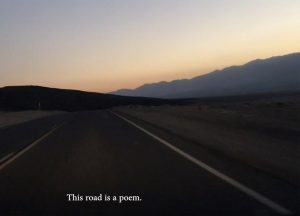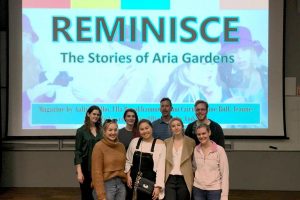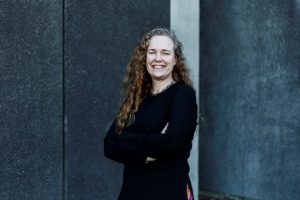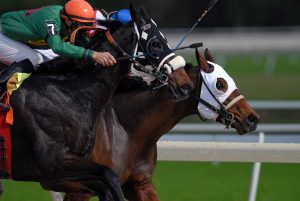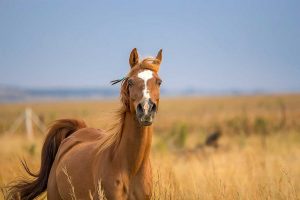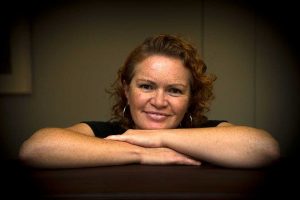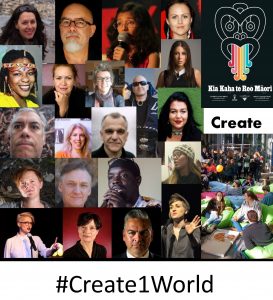Congratulations to Masters of Creative Writing Student Megan Carter, who is exhibiting work as one of nine artists in an exhibition at Corban Estates Arts Centre that interrogates the wide spectrum of human emotions and the concerns we express as people living in the modern age.
Magazine of memories for aged-care residents
Meeting residents in an aged care facility and turning their conversations about the past into a magazine of memories proved to be a rewarding project for Massey University students as much as for the elderly residents they befriended in the process.
The Auckland-based expressive arts students enrolled in the Creativity in the Community course – part of the Bachelor of Arts and Bachelor of Communication degrees – spent time with residents at Aria Gardens home in Albany to explore their memories of life in the 1950s and ’60s. They collaborated with residents, including two with dementia, to create a one-off magazine, called Reminisce, which they launched earlier this month in a special event at Aria Gardens.
Student Ella Brookhammer said at the launch that the students hoped to “enable those that we worked with to look back on their lives fondly and reminisce with us. I personally spoke with Emma, who, as a long-time magazine reader, had many pieces of advice that aided me in the editing process for this project. Her suggestions included having interesting stories and most definitely a puzzle page!”
The magazine included articles and illustrations to reflect the interests and passions of the residents, such as former mechanic Alistair. He shared his memories and knowledge with student Liam Cairns for an article titled ‘A Look Inside the Mechanic’s Workshop’. It focused on the rare Kiwi icon, the Trekka, New Zealand’s only domestically designed and produced car.
In other articles, Patricia shared her travel stories and adventures, including getting engaged to her husband at the Taj Mahal in India under the moonlight. ‘It was the best day of my life,” she says in the article.
Vietnamese-born Hak, who moved to New Zealand in 1982, revealed his secret recipe for his favourite noodle dish, a Vietnamese-Cambodian fusion of herbs, spices, meat and vegetables.
Theatre lecturer and course convener Dr Rand Hazou, a specialist in applied and community theatre, says the course is designed to give students an opportunity to apply their creative skills and knowledge within a specific community context. “Working in groups under close supervision, students conceptualise, design, produce and then evaluate creative art projects within a specific community setting.”
Community engagement
“The course not only provides students with a creative and artistic outlet on a social issue – it helps to develop their project management and stakeholder engagement skills as well as their confidence,” he says. “Ultimately, it aims to show students that they can think of an idea for a creative community project, draft a brief, and apply for funding to help deliver a project to a community in need.”
By partnering with Aria Gardens, an aged care facility close to Massey’s campus in Albany, the students focused on delivering creative interventions that explored issues of positive ageing and dementia, Dr Hazou says.
“According to Alzheimers New Zealand, two out of every three New Zealanders are touched by dementia. For a third of New Zealanders, dementia is one of the things feared most about ageing. The partnership with Aria Gardens gave us a unique opportunity to engage with some of the issues surrounding ageing and dementia, and find creative interventions that challenge negative stereotypes within the wider community.”
Aria Gardens manager Paul France said of the project: “I loved the approach the students took with our residents. It was obvious they probed beneath the surface and understood their passions, motivators and things that bring them happiness.
“You could feel the pride in our residents as their contribution was showcased and it made them feel special being given their own two-page spread in such a prestigious and creative magazine.”
Dr Hazou emphasises that the course is designed to make students not just “work ready”, but what is being called in the pedagogical literature “world ready”. “It aims to develop their capacities as adaptive, engaged and responsible citizens,” he says.
These learning motivations are also reflected in Massey’s innovative BA programme, which was re-designed several years ago to include new core papers on cultural identity and belonging, local and global citizenship, and community engagement.
Theatre and masks reveal life behind prison walls
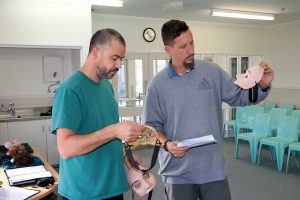
Mask artist Pedro Ilgenfritz and Dr Rand Hazou prepare for the performance of Walls That Talk. (Photo credit: Sarah Woodland).
Stories of prisoners’ lives usually stay locked up – but a group of male prisoners in Auckland has had the chance to study performance techniques and to share their experiences of being behind bars through a special theatre project led by Massey University.
Walls That Talk: Ngā Pātū Kōrero – a documentary theatre project led by applied theatre specialist Dr Rand Hazou – has been in the making for the past few months and culminated in a recent performance to a select audience at Auckland Prison, Paremoremo.
“Despite our high incarceration rates, we hear very little about the reality of prison life, and the personal experiences of those caught up in the criminal justice system remain largely invisible,” Dr Hazou says. “The aim of this theatre project was to challenge this invisibility by allowing the voices of prisoners to be heard on stage.”
Arts in prison a human rights issue
The theatre project provided a creative and therapeutic forum for prisoners to reflect on and better understand their life experiences both inside and beyond the prison walls. Dr Hazou says access to the arts in prison is also a human rights issue. “We need to be supporting engagement with the arts in prison because corrections is a system that often de-humanises people,” he says.
Comments from participating prisoners captured the impact of translating their stories into art.
“It added to my confidence,” according to one. “It’s given me more encouragement to do things, so a bit more direction of how I want to do things. So, when I see something, and I put my mind to it, I know I can do it, so it’s given me that motivation to keep pushing on. I didn’t really think I could do this stuff; it’s been a bit of an eye opener for me. It’s given me a bit of a sense of connection too, a sense of unity.”
Māori model of health to build new walls
In creating the production, Dr Hazou developed interview questions based on Te Whare Tapa Whā (the four cornerstones, or sides, of Māori health) – a model developed by Sir Mason Durie.
“We asked questions about physical health, emotional wellbeing, spirit or wairua, and family health. We then worked with [scriptwriter] Stuart Hoar to pull extracts from the transcribed interviews into a play that the men then performed. The play deals with issues of wellbeing from the experience of the prisoners in Te Piririti [sex offender treatment programme at Auckland Prison].”
Dr Hazou, a senior lecturer in theatre in the School of English and Media Studies at the Auckland campus, says the indigenous model of wellbeing, using the metaphor of the wharenui or meeting house with four walls, was central to the theatre work. “These walls include taha tinana [physical health], taha wairua [spiritual health], taha hinengaro [mental/emotional health], and taha whānau [family health]. Within this holistic model, each wall is necessary to the strength of the building.
Walls That Talk: Ngā Pātū Kōrero is part of a larger project called Prison Voices, a creative collaboration with Dr Sarah Woodland from Griffith University in Brisbane. It includes recorded interview material with the participants at Auckland Prison to be edited into a creative audio work or radio drama.
Dr Hazou has worked across a variety of creative and community contexts. These include in Palestine in 2004, when he was commissioned by the United Nations Development Programme (UNDP) to travel to the Occupied Territories to work as a theatre consultant running workshops for Palestinian youth. His research on asylum seeker and refugee theatre has been published in international journal articles.
He is coordinating the Performing Arts and Justice Symposium (September 5-6) at Massey’s Auckland campus in Albany to bring together performers, arts practitioners, researchers and justice professionals to explore the potential of theatre and the creative arts to transform the justice system.
Visit the webpage for information on keynotes and registration. http://bit.ly/2IR9CuE
Published in The Channel Magazine, Issue 101 August 2019.
Horse Comedy a Trifecta for Massey Playwright
Theatre lecturer and playwright Associate Professor Elspeth Tilley has notched up an artistic trifecta with her third consecutive win at the British Theatre Challenge, this time with a dark comedy about the horse racing industry.
Dr Tilley, from the School of English and Media Studies, has won numerous awards locally and internationally for her plays – often using humour and absurdity to address serious social, ethical and environmental issues. She describes her latest winning short play, titled Fabio the Great, “a hilarious horse-eye view on humanity”.
In it, three horse characters muse on and argue about the perils of their existence while providing an comical, yet insightful, commentary on human behaviour. Fabio is the name of the stallion who spouts platitudes about the thrill of winning and being a champion, despite the pain and risks he endures. His equine companions (a mare and a gelding) urge him to escape before he, too, loses his manhood and fighting spirit to the emasculating scalpel.
The 10-minute play (which won Best Play at Pint Sized Plays New Zealand earlier this year in Queenstown) was one of five winners selected from around 300 entries from around the world for the UK competition run by Sky Blue Theatre Company. Each play will be professionally produced, performed and filmed in London in the first week of October, something Dr Tilley is thrilled about as there a few opportunities to professionally stage short plays in New Zealand.
Dr Tilley, who was winner in 2017 with her play Waiting for Go – about people’s addiction to cars – and in 2018 for Bunnies and Wolves – a reality show critique of the public/private health system, says she likes to use humour to get audiences thinking freshly about issues and aspects of culture that are accepted and taken for granted. Like horse racing.
“The play is a hard punch of anti-animal-cruelty, even to the extent of describing the death toll by over training of two-year-old horses, the brutal medical procedures, the doping to keep an injured horse racing), yet it’s wrapped in the soft glove of character-based comedy,” she says. “There’s actually a lot going on for a 10-minute play that deliberately and disarmingly starts off with an inane fart joke!”
Elspeth Tilley’s award-winning play Fabio the Great uses humour to probe the ethics of horse-racing (photo:Unsplash/Jeff Griffith)
Politics and humour can co-exist
The recognition for the play confirms, she says, that “political work – work that in this case has a strong message about animal rights, with some feminism thrown in for good measure – can win open competitions”.
Not that she is aiming to judge people who like horse racing. Rather, she hopes the play might inspire them to think more critically about the industry beyond the glamour of women dressing up for a race meet in heels, frocks and fascinators, the beauty and speed of the horses and big money to be made as a punter or industry participant. After all, she once had her own part to play – as a student in Australia in her 20s, she earned money to fund her studies working as an actor and model promoting horse racing on the Gold Coast.
Elspeth Tilley’s award-winning play on the dark side of horse racing touches on ideas of why humans feel they are a superior species (photo: Unsplash/Sarah Olive)
Humans vs animals
On a more philosophical note, she says the play touches on ideas of ecological equity, questioning the notion of why humans put themselves at the top of a species pyramid, and the assumed narcissism of seeing ourselves as superior to all other species.
“All three of my works that have made the winners’ list in this competition have been political works – the first one about climate change, the second about public health, and now this one with a strong message against the horse racing industry. To me, this shows that being political doesn’t disadvantage a theatre work in any way – the works are comedic, but it’s comedy with a message.”
Dr Tilley, who rigorously researched the racing industry and equine welfare before writing the play, says she hopes her success will reassure those of her students who “seem to think that being funny and being political are mutually exclusive. But the long history of political satire shows they are elements that are stronger together.”
Dr Tilley says she’d like to see “a whole new generation of expert satirists – I think it is an increasingly important way to speak truth to power and get people thinking critically. I hope this encourages more young people to use the arts to get their own social justice measures across. It is possible. It works.”
Related articles
Creative activism on the move at Massey
Theatre to provoke new thinking on climate change
Create1World High School Student Competition Now Open
 Kua whakatuwherahia! The 2019 Create1World Competition is now open for your entries!
Kua whakatuwherahia! The 2019 Create1World Competition is now open for your entries!
We are looking for entries from students currently in secondary education that show how artistic creativity can help us better understand and resolve global problems faced by humanity in the 21st Century. Themes might include tolerance, inclusivity, diversity, sustainability, peace, human rights, climate change, refugees, global inequality or the responsibilities of multinational organisations.
There are categories for Media Studies and Social Studies, Speech and Drama, Creative Writing and Music, and there are multiple cash prizes in every category.
Go to this page for details: http://sites.massey.ac.nz/expressivearts/2019/03/06/create1world-2019/ (scroll down to see links to Competition Entry info and Tc & Cs).
Then, once you’ve made your fabulous piece of creativity, go to the Create1World Facebook Page and post your submission on the page. Post it as a visitor post (you will see other previous entries in the visitor posts area).
The competition is open until 21:00pm NZST on October 14, 2019. You can enter at any time during this period. If you intend to try for the ‘People’s Choice’ award (most likes on Facebook) you are encouraged to enter early in the competition window, to give your entry lots of time to gather likes.
Best of luck in the competition – we can’t wait to see your entries!
Celebrating the Work of Massey Alumnus Layal Moore
English and Media Studies alumnus Layal Moore has just kicked off Mooreish Creations, an online creative enterprise that can be accessed here.
Mooreish Creations is a culmination of Layal Moore’s best creative work to date. It arose from a strong desire to share her work and incite collaboration with others. For her, art and writing is a means of living and is very much inseparable. It provides a form of catharsis, yet also yields self-affirmation and reassurance.
Layal says: “I create to live and I live to create. This stuff just ‘comes’ to me, who knows from where, but it’s a means of processing. I’ll never sell my creative soul”.
Reframing Literature Through a Maori and Pacific Lens
A new Massey University course looks set to radically reframe what we traditionally consider in the study of literature.
Novelist and Massey creative writing lecturer, Dr Tina Makereti (Te Ātiawa, Ngāti Tūwharetoa, Ngāti Rangatahi) has created a unique course entitled ‘Oceanic Literatures of Aotearoa: Ngā Tuhinga Kōrero o te Moana Nui a Kiwa.’
The course is being launched for second semester study both on campus and by distance and will allow students to explore customary Māori and Pasifika creation narratives, visual narratives and oral traditions.
Dr Makereti says when considering Aotearoa’s literary past, people tend to think of the first Māori literature as being produced in the 1960s and 1970s. But she says Māori and Pacific cultures were weaving narratives long before English explorers arrived on the scene. “Written literature was never alien to us because our ancestors were already using sophisticated coding built into carving, weaving and ta moko to tell our stories. Our wharenui are libraries of stories built into the walls and into the very faces of our tipuna.”
She says it is time academia acknowledged this visual communication is as much literature as oral and written forms and she believes students, especially Māori and Pacific students, need the opportunity to study the richness of their literary heritage.
“Viewing Māori and Pasifika literatures as a recent development devalues them – we can see this in the lack of courses on this subject available nationally, and the lack of research in this area. By re-contextualising the history of our literatures, I hope to re-energise interest in our contemporary writing too.”
Along with studying pre-colonial literature, students will also look at contemporary Māori and Pasifika stories and poems in English and critically evaluate how cultural and historical bias is embedded in reading and writing.
Full details of the course can be found here and it will commence on July 15.
Related articles
Māori literature deserves academic recognition
Excellence in Māori literature celebrated
Lifetime Achievement Award for Massey Luminary
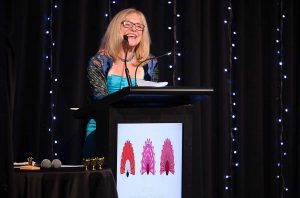 Great theatre can change minds and lives, says Professor Angie Farrow, who credits her childhood amid the lively antics of her extended family in London’s East End with shaping her dramatic sensibilities.
Great theatre can change minds and lives, says Professor Angie Farrow, who credits her childhood amid the lively antics of her extended family in London’s East End with shaping her dramatic sensibilities.
Farrow, a professor in theatre at Massey, an internationally award-winning playwright and a community arts initiator, recently received the prestigious Lifetime Achievement in Theatre Award at the Manawatū Regional Theatre Awards. It’s the latest in a gamut of prizes she has received over her career, in recognition of her outstanding creative output on topics as diverse as love, death, refugees, the plight of the Manawatū river and Kafka, as well as her commitment to community theatre and her skill and passion in teaching theatre.
A dramaturg and executive producer of numerous community theatre events, including the biennial Manawatū Festival of New Arts, the Manawatū Street Theatre Project and the annual Manawatū Summer Shakespeare, she has won national and international awards for her plays, including The Pen is a Mighty Sword International Playwriting Competition in the US for Despatch in 2007 and Best Drama Script at the Auckland Short and Sweet Festival for Leo Rising in 2014. In 2011 she was awarded for her ‘Outstanding Contribution to New Zealand Drama’ by the Playwrights’ Association of New Zealand.
But, after 23 years at the Manawatū campus as a pioneer in the expressive arts and theatre studies programmes in the School of English and Media Studies, and having recently been promoted to a professor, she is about to exit stage left and down the stairs of the elegantly refurbished Sir Geoffrey Peren Building to Wellington, to embrace a new phase of her life.
Professor Farrow discovered her interest in theatre at age 16, although the seeds were there all along, she suspects. “I grew up in a multi-storey house in the East End of London that was full to the brim with my extended family – my nan and granddad, aunts, uncles, cousins, brothers, sisters. There were plenty of dramas – fighting, cursing, arguing, celebrating, laughing, partying, which I must have absorbed unconsciously!”
When a brilliant ‘alternative’ drama teacher started teaching in her neighbourhood she went along with a friend who was “too scared to go on her own”.
The teacher introduced them to devised theatre, improvisation and dance drama. “It was like a foreign language to me, but I really took to it. In particular, it gave me a sense of power and, for the first time in my life, I understood how exhilarating it could be to make something from nothing.”
However, her “obsession” with theatre began when she discovered playwriting in her early 20s. “Writing my first play was a pivotal experience because I realised there were worlds and powerful voices inside me that I never knew were there,” says Professor Farrow, who has published five volumes of her short plays for stage and radio.
Theatre is a like a drug
Theatre has always been like a drug, she says. “Most of us who are involved in it see it as an addiction.” And while the process of creating theatre can be exhausting to the point of wanting to give it up at times, she invariably returns to it. “I do believe that theatre can change lives – I’ve seen it first-hand hundreds of times. People discover that they are so much more than they imagined. They find deep friendships, they sharpen their sense of integrity; they become politicised; they learn how to express themselves fully through voice, mind and body; they learn about discipline; and how to meet deadlines.”
Political focus
Other accolades include first prize at The Inspirato International Playwriting Contest in Toronto in 2013 for her short play The Blue Balloon, a magical, existential 10-minute play and an example of the power of short plays, or what she calls “haiku theatre where you say big things in small spaces”.
She believes that theatre can be a powerful agent of change for audiences when it addresses political issues without being preachy. “We live in a time when global issues can penetrate every aspect of our lives – we know about the famine in Yemen, the bush fires in Australia, the threat of climate change. Done well, theatre is capable of synthesising these ‘big picture’ realities into narratives that audiences are able to absorb without being overwhelmed.”
Receiving the lifetime award has, she says, humbled, honoured and delighted her. “Theatre is one of the best forms I know to cultivate and enhance community and because it gives me great joy to see people working harmoniously together and with a common purpose.” Over two decades, it also represents the “hundreds of people who have contributed to my experience, my success,”she says.
Teaching is her first love (in 2010 she won a $20,000 national tertiary teaching excellence award), and it is the students she will miss. “Theatre is an intellectually rigorous form, whether students are studying or writing plays or whether they are exploring a character as an actor. All of the courses we teach at Massey attempt to use critical and creative learning and it’s the combination that provides depth and rigour.”
The award has also helped her to focus on what happens next. She hopes to continue her playwriting as well complete an anthology of stories based on growing up in the East End. Mainly, she wants to make space for new things to happen, but right now she isn’t quite sure what those new things might be.
“Massey has been very good to me and has offered a place of discovery, stimulation and support, I will miss being around so many great colleagues and amazing students, but it really does feel time to open a new chapter.”
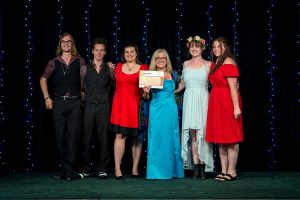 This year, Massey Community Theatre – made up of students and staff from the University’s varied drama programmes – swept up five awards in all. Firing Line, a piece of street theatre devised, written and performed by Creativity In The Community’s class of 2018, took out both the Best Ensemble and Best Original Script and Production awards. The show’s technical support team, comprised of Luke Anderson, Leith Haarlhoff, Sean Monaghan and composer/Massey artist-in-residence David Downes won the Technical Design and Operation award for their multimedia spectacle, and School of English and Media Studies staff member and technician Luke Anderson won the Gordon Alve Memorial Award in Technical Excellence.
This year, Massey Community Theatre – made up of students and staff from the University’s varied drama programmes – swept up five awards in all. Firing Line, a piece of street theatre devised, written and performed by Creativity In The Community’s class of 2018, took out both the Best Ensemble and Best Original Script and Production awards. The show’s technical support team, comprised of Luke Anderson, Leith Haarlhoff, Sean Monaghan and composer/Massey artist-in-residence David Downes won the Technical Design and Operation award for their multimedia spectacle, and School of English and Media Studies staff member and technician Luke Anderson won the Gordon Alve Memorial Award in Technical Excellence.
Create1World 2019
Create1World 2019
Nau mai, haere mai. Welcome to the Create1World 2019 Competition and Conference information pages – Join us to create one world through expressive arts and creativity! Hono atu ki te whakataetae Create1World. Mahi tahi mo te rangimarie.
Massey University invites young people aged 12-18 (or in schooling equivalent to years 7-13) to enter the 2019 Create1World competition, and/or to join us for a fabulous day of creative inspiration including local and international panellists answering your questions, along with performances, workshops and activities. Last year our conferences were rated 8.9 out of 10 by participants on whether they would recommend them to others!
The competition asks you to produce a creative piece that encourages audiences to join together as a global community and solve some of the big problems we face as a planet. It could be a video, song, poem, short story, speech or theatre performance – your choice – but it must help us think about ways of working collaboratively for the betterment of all humanity. There are cash prizes! Continue reading
Massey University and Square Edge Visiting Writer 2019 – Pip Desmond
Massey University and Square Edge Visiting Writer 2019 to work on Topical True Story
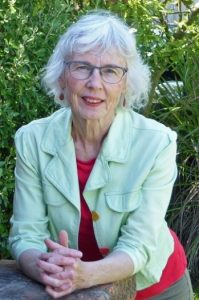 Massey University’s School of English and Media Studies and Square Edge Community Arts are excited to be hosting award-winning nonfiction author Pip Desmond as the Visiting Artist for 12 weeks from March 2019. Desmond will be working on the true story of a family faced with the suicide of their 21-year-old son while in the care of a DHB acute mental health unit.
Massey University’s School of English and Media Studies and Square Edge Community Arts are excited to be hosting award-winning nonfiction author Pip Desmond as the Visiting Artist for 12 weeks from March 2019. Desmond will be working on the true story of a family faced with the suicide of their 21-year-old son while in the care of a DHB acute mental health unit.
Say creative writing lecturers, Dr Thom Conroy and Dr Tina Makereti:
“We had 63 applications this year, and we would have liked to support many of these for different reasons. We were lucky to see some very strong projects and writers. However, in the end, Pip’s project emerged as the most compelling and urgent, due to its subject matter. We note that just as we were making our final decision, the media reported the Coroner’s ruling that the young man’s death was avoidable. Though not related to our decision, this news was confirmation that the work Pip Desmond is doing is extremely timely and relevant, particularly to young people and mental health support systems in Aotearoa New Zealand.”
Desmond has an impressive publication record, which includes the New Zealand Post Award-winning Trust: A True Story of Women and Gangs (2010) and The War That Never Ended: New Zealand Veterans Remember Korea (2013). Her latest memoir, Song for Rosaleen, has been longlisted for the 2019 Ockham NZ Book Awards.
Desmond explains about her new project:
“My aim in telling this story is to shed light on issues that deeply affect our society: how we deal with mental illness and our burgeoning suicide epidemic, involvement of families in their loved ones’ care, political responses at district health board and government level, and the tragic pattern of inter-generational suicide created by Māori dispossession.”
While she is resident, Desmond will collaborate with the School of English and Media Studies at Massey University, Square Edge Community Arts and the Palmerston North writing community to share her work and writing experience. She has a particular interest in ethics in creative writing, and presented a TEDxTalk about the topic in Wellington, which can be viewed on YouTube.
We’re also very pleased to announce that our 2020 Massey University and Square Edge Arts Visiting Writer will be New Zealand speculative fiction writer and three time Sir Julius Vogel award winner Octavia Cade. 2020 is a great year to highlight an exciting New Zealand science fiction writer, since Wellington will be hosting the 78th World Science Fiction Convention, CoNZealand.
For more information about Pip Desmond, Octavia Cade, or the visiting artist residency, contact Anne Meredith (email: A.M.Meredith@massey.ac.nz) or Thom Conroy (Phone: +64 6 9517508; email: t.conroy@massey.ac.nz).
